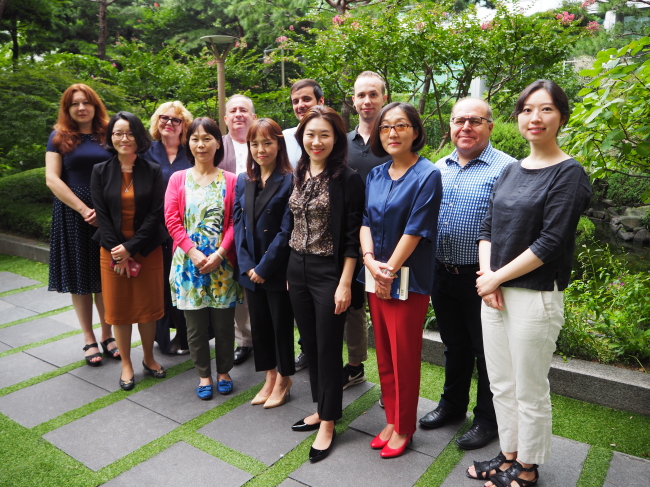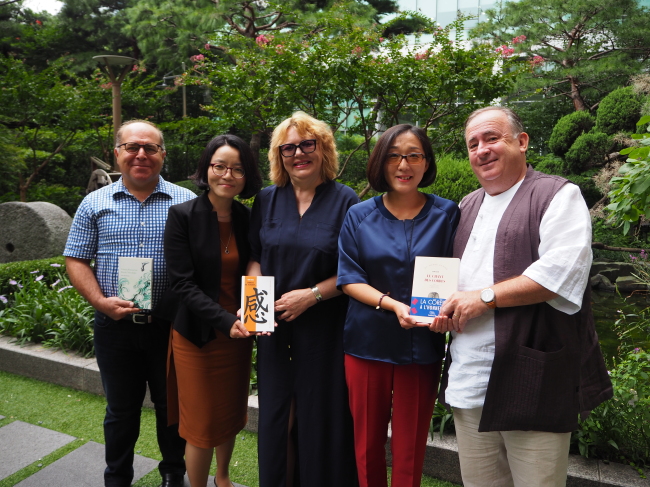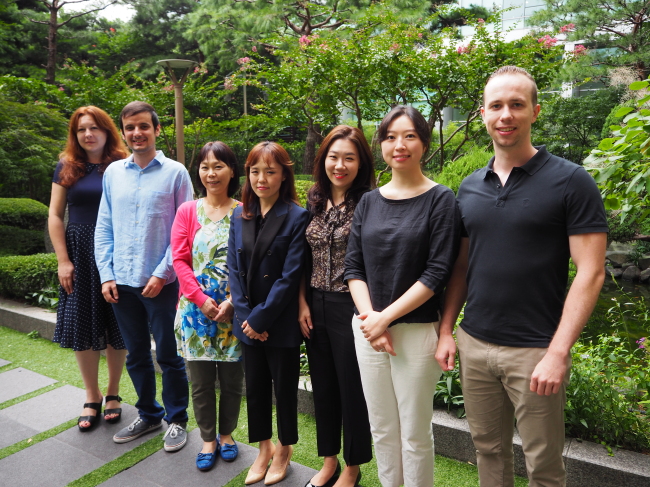Every time Goksel Turkozu browsed through a bookstore in Turkey, he felt there could be more books of Korean literature in translation in his country where the passion for everything Korean runs high.
A devotee of Korean literature and professor at Erciyes University in the city of Kayseri, Cappadocia, Turkozu has adapted several well-known Korean novels into the Turkish language since he first set foot in Seoul in 1990 as a student.
His decadeslong dedication to spread Korea’s literary imagination to his homeland won him the Korea Translation Award given by the Literature Translation Institute of Korea on Wednesday, alongside other translators. The event was established in 1993 for the purpose of encouraging quality translation of Korean literature and its overseas promotion and publication. Since 2013, the award has been expanded to cover less widely spoken languages around the world.
“The popularity of Korean cultural wave Hallyu is still high in Turkey after more than 10 years,” Turkozu told The Korea Herald on Tuesday at a press conference in Seoul, one day ahead of the award ceremony recognizing the contributions of 150 translators and related professionals.

Winners of the LTI Korea Awards organized by the Literature Translation Institute of Korea pose at a press conference in Seoul on Tuesday. (Joel Lee/The Korea Herald)
“Young Turks love Korean dramas and K-pop, and increasingly more people want to fill their intellectual hunger with Korean culture. But there’s a great lack of information about Korea in our language. Particularly, the older generations know the country through the 1950-53 Korean War, where many Turkish soldiers fought and died, but they also want to grasp Korea’s sophisticated, contemporary mindset.”
Turkozu translated Ahn Do-hyun’s novel “The Great Journey of Silver Salmon,” titled, “Gumus Somon’Un Buyuk Yolculugu” in Turkish, a tale of a silver salmon in a pack of red salmons, who is ostracized for its skin color. He called the novel a “children’s tale for adults,” with many poetic expressions and moral precepts about love, acceptance and openness, narrated through the salmon’s eyes.
In Turkey, where Chinese and Japanese works are readily available, readers’ thirst for Korean literature has swelled over the years, the academic said. He added that more and more Turkish publishers have sought to introduce Korea over the last decade.
“Despite being geographically far apart and historically separated for centuries before the Korean War, we share highly similar cultures,” according to the Turk. “For example, my translation of author Han Kang’s three-part novella ‘The Vegetarian’ (the winner of last year’s Man Booker International Prize) was very well-received in Turkey, as many people sympathized with its leitmotif around the patriarchal mainstream society’s oppression of minorities like vegetarians.”

Winners of the LTI Korea Translation Award organized by the Literature Translation Institute of Korea pose at a press conference in Seoul on Tuesday. (Joel Lee/The Korea Herald)
Acknowledging Turkish author Orhan Pamuk has become an international star helped by excellent translation, Turkozu argued that his country offers scores of literary masters and aspirants, whose talents have yet to be known globally.
Other winners of the Korea Translation Award went to Jung Ye-won who translated author Jung Young-moon’s “Vaseline Buddha” into English; Seung Joo-yeoun and Aleksandra Goudeleva for their joint translation of writer Kim Young-ha’s “Nobody will know...” into Russian; and Han Yumi and Herve Pejaudier who together adapted novelist Kim Hoon’s “Song of Strings” into French, titled, “Le Chant des Cordes.”
“Translators have to be intellectual, cultured and talented writers. But every new translation is a fresh universe to us. If simultaneous interpretation is a nerve-racking line of work, translation is an equally brain-wracking one,” said Lee So-yeong, who received the Translation Award for Aspiring Translators for Cho Hae-jin’s novel “L’Adieu aus objets” adapted into French, at a press briefing Tuesday.
“Literature translation is now my sole path forward through a long and arduous tunnel. I want to express my deep gratitude to the panel of judges for recognizing my small potential and selecting me,” she added.

Winners of the LTI Korea Translation Award for Aspiring Translators organized by the Literature Translation Institute of Korea pose at a press conference in Seoul on Tuesday. (Joel Lee/The Korea Herald)
Other winners of the Korea Translation Award for Aspiring Translators include Ann Mee-jung Kim and Sarah Lyo, who translated “Three for the Road” and “A Farewell to Objects” into English, respectively; Vincent Kreusel for “Abschied von den Gegenstanden” in German; Alvaro Trigo Maldonado for “Viaje para tres” in Spanish; Lyudmila Mikheesku for “Sam-in-haeng” in Russian; Liu Zhong-bo for “Good bye to Objects” in Chinese; and Mariko Takeuchi for “Good bye to Objects” in Japanese.
“The size of the Korean section in any bookstore in France is tiny compared to Chinese and Japanese sections. It is small but definitely has an existential presence,” said Pejaudier. “Literature translation is, within a wider context, a transmission of the larger culture. Therefore I believe sustained efforts should be made to project Korean culture onto the world stage over the long term.”
The Literature Translation Institute of Korea also awarded the Korea Outstanding Service Award to Jennifer Crewe, associate provost and director of Columbia University, and Antonio Domenech del Rio, anthropologist and historian, in recognition of their contributions to promoting Korean literature.
By Joel Lee (
joel@heraldcorp.com)








![[Graphic News] More Koreans say they plan long-distance trips this year](http://res.heraldm.com/phpwas/restmb_idxmake.php?idx=645&simg=/content/image/2024/04/17/20240417050828_0.gif&u=)